1917 revolution of the year: from the "bread superpower" to the industrial giant
A number of historians today not only refute the fact that the revolution was inevitable, but for the sake of conjuncture they distort reality, presenting instead stories the beginning of the century the catastrophe film: the bloody Bolsheviks came to earthly paradise and broke everything. Such an ideology is encouraged at the highest level under the auspices of the “reconciliation” movement. The authorities are forming the myth of the beautiful "Russia that we have lost" and with "great difficulty we acquire back" after the "saints" 90's. Of course, this is a simplification, but the trends are obvious, it seems, to everyone.
In the centenary of the revolution, I would like to recall exactly what the Russian Empire was on the eve of the memorable events, and to stop presenting the desired for the real. No one argues that any state needs an official reading of past events - and Russia is no exception - but the Great October Revolution must take its place of honor.
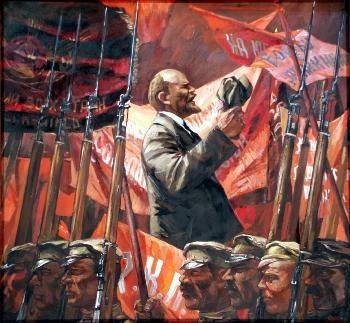
October 1917 years
"October came, and from 6 to 25 in October, the Bolshevik faction was headed by Trotsky. This faction came to the opening of the Pre-Parliament, where Trotsky delivered a speech, from which it was clear that the course was set for seizing power, that is, an armed uprising, - tells about the revolution Alexander Pyzhikov, Doctor of Historical Sciences and author of the Chronicles of the Revolution, as a historical event. ”He spoke very clearly about the seizure of power. After that, the Bolshevik faction left the meeting of the Pre-Parliament, and this parliament again plunged into sluggish her dying, which already did not arouse any interest in anyone. Lenin and Trotsky - these were the driving forces that took the course of an armed uprising, and they were fully supported by the youth led by Nikolai Ivanovich Bukharin. "
Among the Bolsheviks were those who considered it dangerous to take power in one hand, this part of the party was headed by Zinoviev, Kamenev and Rykov. But no one outside the Bolshevik Party was going to prevent an armed uprising. The pretentious Februaryists and indifferent observers gave the Bolsheviks on the strength of three to four months at the helm of the state. Everyone doubted that they would be able to rule the country, and therefore nobody was going to prevent them from turning their necks. Of course, already the Soviet propaganda created the legends about the brilliant storming of the Winter Palace, about the triumph of justice, necessary for the education of young people.
But in reality, the revolution was so calm and bloodless, that the Bolsheviks, out of modesty, at first called it the "October coup." Much later, when it became clear that a change of structure entailed revolutionary changes in society, in the state and even throughout the world, it was realized that the coup was the "Great October Socialist Revolution."
According to the historian Alexander Pyzhikov, no one was going to oppose Lenin, during the revolution the bourgeoisie was sitting in the taverns and waiting for something. The people are tired of waiting.
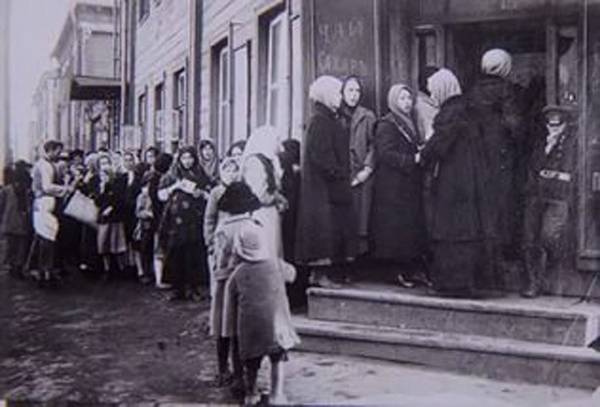
“They didn’t protect the monarchy, but now they didn’t protect those who overthrew the monarchy. Nobody was going to defend the Provisional Government on October 25. We know that this storming of the Winter Palace took place was very different from the same July events. The July events were much more serious in Petrograd — in fact, the whole city was in turmoil, extremely tense, shooting indiscriminately — dead here and there. 3-4 July was a tense time, and when the storm of the Winter was under way, people worked in the city storany and theaters. "
"Agrarian Superpower"
Among the first decrees of the Bolsheviks, who came to power, was a decree on the land. Actually, the Februarylists promised this, but they did not fulfill the promises. Here the Gordian knot of the landowner-peasant conflict, which began long before the 1861 year and was only intensified with the reforms of the tsarist government, was cut down immediately and without any complicity.
The fact is that "the liberation of the peasants" gave a benefit, first of all, to the nobles themselves, paradoxically. The peasants were freed and obliged the landowner to allocate allotment of land for the family of the "new farmer" - but the freed serf had no right to give up this land and go to the city, for example, he was obliged to farm for at least nine more years! The free peasant was imposed on a loan — he had to either pay the serfdom and dues to the landowner, or buy out his "settledness" from the sovereign. The state bought communal lands from landowners (at one time the nobles received 80% of the cost) - they allotted the land to the peasants on condition to pay the loan for 49 years (hello, mortgage) to pay the loan, the peasant hired the same landowner or went to the "fist".
That is, it seems, everything has changed, but it remains as before - the peasant was forced to work there and in the same way as before, but he was no longer "serf", but supposedly "completely free" (without the right to leave and without a passport) .
By the way, another advantage for new landowners was that before the reform, our aristocrats from the land had time to lay down and re-pledge the estate and land in the banks so that if 1861 had not arrived a year, many landlords would simply go bankrupt.
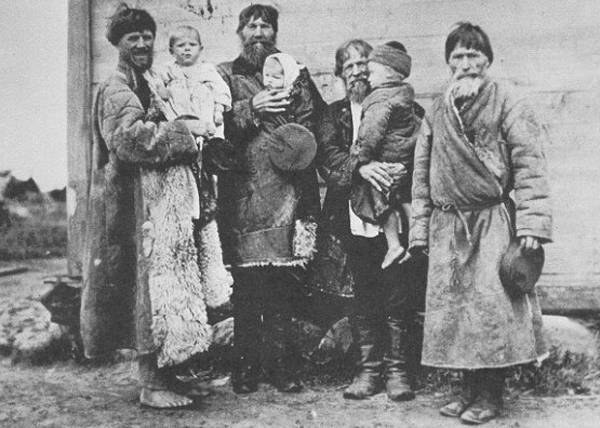
October, 1917, Revolution, Civil War, peasants, workers, November 7, Great October, socialist revolution | Photo:
Thus, as a result of the reforms, landowners turned into capitalist "enterprises" for selling grain abroad. The major bread oligarchs were about 30 thousand people, and 70 million dessiatines of land concentrated in their hands, with a steady increase in grain prices for the ruling class, the situation became very profitable. These "enterprises" supplied 47% of grain exports. Here it is - the very 1% (700 families) elitarians, closely connected with the yard, it is their life and life that we see on the big screens in the films about “Russia that we have lost”; for some reason, they consider their ancestors 99% of children proletarians in the vastness of our post-perestroika country.
The hungry riots were suppressed, the peasants were not released from the villages, the peasant was cruel to starvation, then from the war, so looking for conspiracies "from outside" in a spontaneous "peasant" revolution means not to notice the obvious.
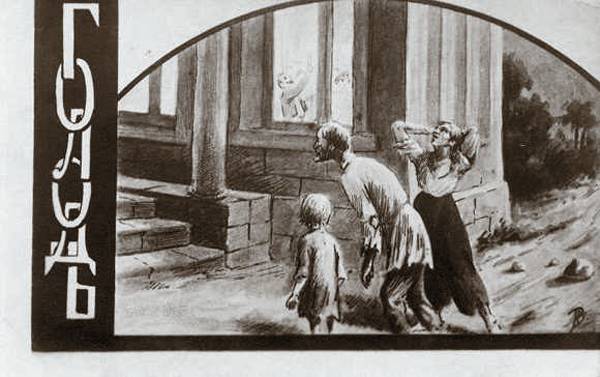
October, 1917, Revolution, Civil War, peasants, workers, November 7, Great October, socialist revolution | Photo:
And what have we lost?
The monarchists say that it was necessary to wait a little longer, and life would be much better - after all, the Russian Empire was developing so rapidly, especially in industrial terms.
Indeed, Russia took the path of the countries of developed capitalism, industrial production grew, but even half a century after the start of the 1861 reforms, the huge country accounted for only 4,4% of world industrial production. For comparison, the United States gave 35,8% (Oleg Arin, "Truth and fiction about Tsarist Russia"). 80% of the population at the beginning of the industrial 20 century in the Russian Empire were peasants. The village was engaged in hard manual labor - like 100 years ago, and only 12,6% of the population were citizens - this is not enough for industrialization. The middle class was absent, and the bourgeoisie was not an independent political force. Yes, there were factories and plants - at least a little, but they were. Here is another question - to whom they belonged? Not the Russian people. And not even the king-father. Most industry was owned by foreigners.
"Despite the rather high rates of economic growth, the Russian economy was an ugly brainchild of completely different economic structures - from patriarchal to feudal and bourgeois. And at the same time, for example, foreign capital dominated such advanced industries as oil industry, iron production, coal mining, steel and iron smelting, ”historian Yevgeny Spitsyn said in an interview with Nakanune.RU.“ The banking sector of the Russian Empire was largely supported by foreign loans and from the largest banks Russia is only one of the Volga-Vyatka could rightly be called Russian bank. And in such giants as the St. Petersburg International Bank, the Russian-Chinese bank, the Azov-Don Bank, a significant part of the capital and assets owned by our foreign "partners".
What is this "industrialization"?
In modern myth-making about pre-revolutionary Russia, the motive "Under Nicholas II, industrialization began" is strong. Interestingly, they did not know such words in tsarist Russia (it appeared only in disputes at congresses of the Bolshevik party at the end of the 20s). But, nevertheless, the need for accelerated industrial development was also discussed during the reign of the king, the first factories and plants also appeared at this time. But can we talk about the industrialization of our state, if most of the industrial capital was foreign?
In 1912, such a popular and important industry as the textile industry belonged to the Germans by half. The matter was worse in metallurgy and machine building, industries traditionally considered to be the basis for industrialization - industrial sectors belonged to the Germans 71,8% (noteworthy - and this is on the eve of the war with Germany ?!), on 12,6% - to the French capital, on 7,4% - to Belgian capital. The Russian bourgeoisie had only 8,2% of the industry ("The Revolution that Saved Russia," Rustem Vakhitov). This was the case with industrialization - yes, it was, but not in the Russian Empire.
“Yes, there were industries owned by foreign capital on 90. If someone else’s furniture was brought to your apartment, it won’t become yours. For example, factories were built in a number of current developing countries, but they belong to transnational corporations,” the historian comments. and publicist Andrei Fursov in an interview with Nakanune.RU.
By the way, the same situation was in the field of finance - one third of all commercial banks in Russia were foreign. It is worth noting that foreigners were not interested in qualified personnel - they brought their specialists to manage, and Russian peasants who went to work in the city, used for hard and simple work, without caring about health care, or working conditions, or advanced training (paid and then once).
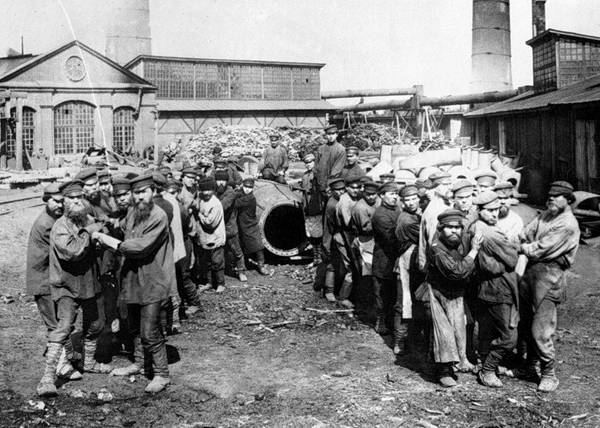
October, 1917, Revolution, Civil War, peasants, workers, November 7, Great October, socialist revolution | Photo:
"We will not finish, but we will take out!"
As for the high export figures, which monarchists now brave about, considering that a country that exported so much grain cannot be considered poor - then it is worth noting that, indeed, the export of grain was large. Russia exported bread, which was often lacked by the peasants themselves, and in exchange imported cars and manufactured goods. It is difficult to call it industrialization. Well developed only railways, and this is understandable - the country traded, it was necessary to deliver grain to the Europeans.
The export data is really admirable - 1900 million poods were exported in 418,8, 1913 million poods were already taken out in 647,8 (Pokrovsky, "Foreign trade and foreign trade policy of Russia"). But only at what point with such a pace of export of raw materials did the Russian Empire suddenly become a country of "developed capitalism"?
No, it draws more on the raw state, appendage to the developed countries or, as historians sneer, the Russian Empire was a "bread superpower."
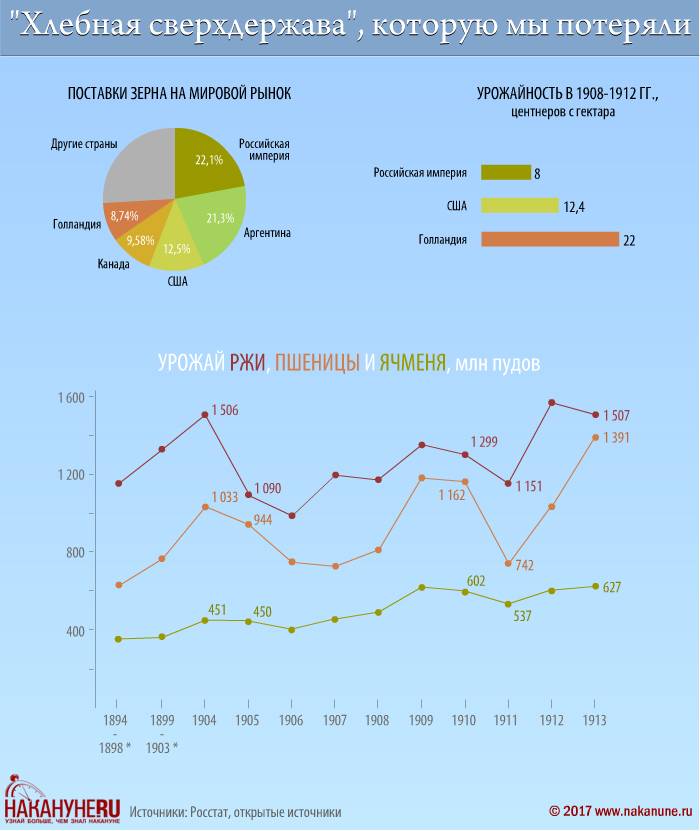
infographics, "bread superpower", which we lost | Photo: On the eve.RU
If we talk about success, the Russian Empire very successfully fit into the system of world capitalism as a source of cheap resources. Today we are told that Russia was the world leader in the export of grain - yes, it is. But at the same time, Russia had the lowest yield!
"In 1913, Russia supplies the world market with 22,1% grain, while Argentina 21,3%, USA 12,5%, Canada 9,58%, Holland 8,74%, Romania 6,62%, India 5,62%, Germany 5,22%, - writes Yuri Bakharev in the book" About grain production in Tsarist Russia. ”- And despite the fact that grain yields in 1908-1912 in Russia were around 8 centners per hectare, and in France and the USA - 12,4, in England - 20, in Holland - 22. 1913 was collected in Russia 30,3 puds of grain per capita. In the US - 64,3 pounds, in Argentina - 87,4 pounds, in Canada - 121 pounds. "
Historians call the primitiveness of agricultural technology and the objective geographical conditions the reasons for such indicators. But this is the reason that the tsarist government continued to export bread to the Western countries, which was needed by its own peasants - a mystery. Although ... not so difficult - wheat and barley from the village turned into gold, money and shares for landowners, bankers and the highest aristocracy. The elite had to live no less well than the western, and for expensive pleasures, luxury goods went about half of the profits for export.
The historian Sergey Nefedov in his work “On the causes of the Russian revolution” writes that in 1907, the income from the sale of grain amounted to 431 million rubles. 180 million rubles, 140 million rubles were spent on luxury goods. Russian nobles left in foreign resorts. Well, and the modernization of the industry (the supposedly industrialization) received only 58 million rubles. (Rustem Vakhitov "The Revolution That Saved Russia"). Do not forget that every two or three years in the agrarian country pockets of hunger broke out (because of poor harvests, for example), but the government continued to carry wagons with grain along fine railways abroad.
When Vyshnegradsky, the author of the immortal phrase "We do not finish, but we will take out", the export of bread doubled. If even then they spoke of the need for industrialization - why did they continue to feed the elite at the expense of exported bread? What part of the wealth of the land went to industry, development, schools? It becomes clear that the necessary changes in the economy and industry were simply impossible without a change of lifestyle. Without a "change of energy."
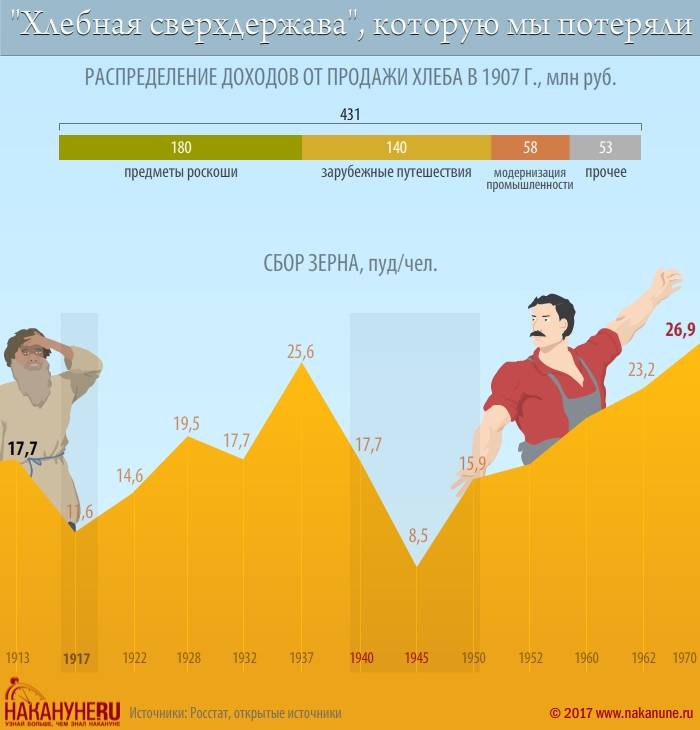
infographics, "bread superpower" that we lost, grain collection, Russian Empire, USSR | Photo: On the eve of.RU
Energy change
"The tsarist government could not solve the agrarian problem, it could not cut the knot of contradictions between the nobility and the bourgeoisie, and the economic problems of Russia at the beginning of the 20 century were not economically resolved. They could be solved only by social means. That is, by social reorganization," says Nakanune. RU historian and publicist Andrei Fursov. - For Russia, the fate of the Western semi-colony was prepared. By the way, not only left-wing thinkers, but also thinkers of the opposite camp, for example, Nikolay Osipovich Menshik, understood this well. who wrote that if no "change of energies" occurred in Russia - he could not write a "revolution" in those conditions, he wrote "social energies", but by this he meant a revolution - then Russia was destined colonies of the West. "
Experts believe that contemporaries should recognize the merits of the socialist revolution and pay tribute to Lenin as a historical figure, objectively analyze the period, and not demonize him. The British, French and Americans recognize their revolutions and civil wars as important milestones in history, despite the contradictions left in society — some in France are under the Jacobin terror, and many Americans are outraged that Lincoln himself was a slave owner, there are also English people totally dissatisfied with Cromwell. But no one in the world descends to denigrating his own history, especially when there are more reasons for pride than reasons for grief.
"In the very difficult conditions that were in our country after October 1917, the Soviet Union demonstrated not only its uniqueness, but also the highest efficiency. The principles on the basis of which the system of government, economics, security and even culture functioned were radically different from foreign analogues, says Nikita Danyuk, Deputy Director of the Institute of Strategic Studies and Forecasts of RUDN, in a conversation with Nakanune.RU. - A backward and half-ruined country weakened after the First M "In a short period of time, a bloody civil war turned into a powerful state that began to dictate its conditions in the international arena, creating an effective and attractive alternative to the development of the state and society. Without the Great October Socialist Revolution, there would have been no Victory in the Great Patriotic War."
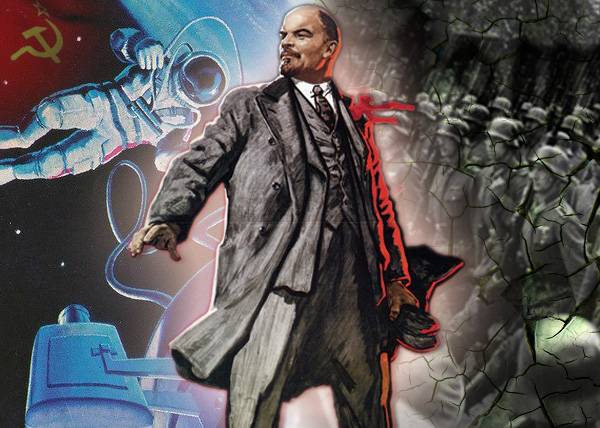
collage, October revolution, Wehrmacht, man in space, Lenin | Photo: On the eve.RU
The development of the Russian state stalled at the stage of the “agrarian superpower”; the empire, in captivity of its own elitarians, put an end to the development of industry. Without a revolution and a “land” decree, a country could not exist further in a world where other states had moved to a new technological level.
“There is Stalin’s famous expression that we have lagged behind the advanced countries by 50-100 years, and we will either run this distance in 10 years, or they will crush us. A radical change in the socio-economic system is the result of the October revolution. Then people reduce this 50-year lag. This is the fundamental, most tangible result of the October Revolution, "- said in a conversation with Nakanune.RU Doctor of Historical Sciences, former State Duma deputy Vyacheslav Tetekin.
Not "bloody Bolsheviks" destroyed the country - by the beginning of the 20 century Russia approached the already split, there were two "nations": the ruling stratum on the one hand and 80% of the subordinate people on the other. The two "nations" even spoke different languages and seemed to be living at different times, so the Russian village lagged behind the world in the 20 century. Moreover, some historians call these 80% of peasants the inner colony of the Russian Empire, due to which the aristocracy could maintain a defiantly high standard of living.
The revolution as a fundamental change in the socio-economic and political structure became the resolution of the conflict. A wave of social discontent was felt. Fevralisty tried to smooth it, and Lenin decided to lead. The king denied - so fell autocratic nobility government. After February, the bourgeois government was unable to keep the country united, a "parade of sovereignties" began, chaos, the collapse of the state. And only then on the stage appeared first small, but rapidly growing "there is such a party." Yes, in 1917, the change in the structure has not yet taken place, historian Andrei Fursov reminds. And after the relatively quiet seizure of power in front, the Bolsheviks had a period of civil war — defense of the revolution and struggle against the interventionists (who in many ways provoked the civil war). Then followed the period of the NEP.
"It was only from the end of 20 that the socialist reconstruction of society really began. In addition, for ten years after the October Revolution, there was a struggle between the left-wing globalists who started the revolution in Russia so that it could become the ignition of the world revolution in the leadership of the Bolsheviks, people like Stalin, who proceeded from the need to build socialism in one particular country, ”says Andrei Fursov.“ That's when these forces won by the end of the 20-s, the socialist transition really began a triple of society. As a result, a society of systemic anti-capitalism arose - the Soviet system, which solved the problems that the autocracy could not solve for centuries. And the people who came "from below" became brilliant designers, military leaders, scientists. The result of this reorganization is the prologue which was the Great October Socialist Revolution, and became the Soviet society. The only society in history built on the ideals of social justice. "
Information